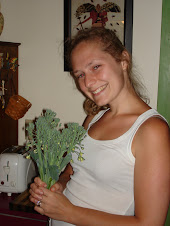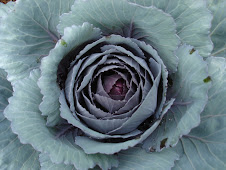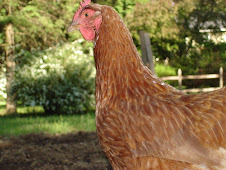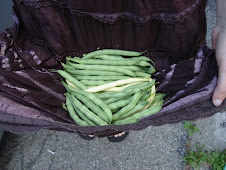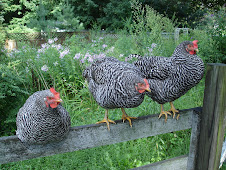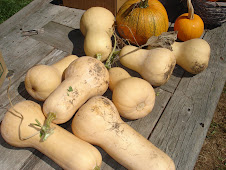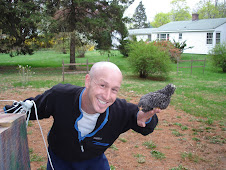 These are the arugula seeds that I planted on Saturday. I love the way all seedlings look when they are pushing their heads out of the dirt. It always makes me so proud!
These are the arugula seeds that I planted on Saturday. I love the way all seedlings look when they are pushing their heads out of the dirt. It always makes me so proud! First Signs of Life
 These are the arugula seeds that I planted on Saturday. I love the way all seedlings look when they are pushing their heads out of the dirt. It always makes me so proud!
These are the arugula seeds that I planted on Saturday. I love the way all seedlings look when they are pushing their heads out of the dirt. It always makes me so proud! Who Says Chickens Aren't Smart?

When Joe went out to take the picture they all came running because boy, do they love their papa. But you get the idea.
And here's what else he got -


A little frightening at eye level, no? But how cute are their little footprints?
Proudly 'Pushing It'
 It turns out that I am well within normal planting schedules by starting onions in February. They should be started this month so that they have two months to grow before they get set in the ground outside in April. Perfect! We bought onion seeds last year, but we didn't have any in our garden, which I thought meant that we had just forgotten about them. But when I took them out they had already been opened... which means I probably planted some last year and they never germinated. But hopefully they'll work this time, because we eat A LOT of onions and it could save us some money to have our own. :)
It turns out that I am well within normal planting schedules by starting onions in February. They should be started this month so that they have two months to grow before they get set in the ground outside in April. Perfect! We bought onion seeds last year, but we didn't have any in our garden, which I thought meant that we had just forgotten about them. But when I took them out they had already been opened... which means I probably planted some last year and they never germinated. But hopefully they'll work this time, because we eat A LOT of onions and it could save us some money to have our own. :)
And here is my completed tray of onions!
I know it doesn't look like much, but I'm hoping that after several days we'll start to see what should look like blades of grass popping up everywhere.
So, honestly there really isn't anything else that you're supposed to plant in February. But Joe and I LOVE greens and so I decided to do an experiment with some mesclun and arugula seeds inside. I can't really see why it wouldn't work - once they germinate we'll have to leave them by the south facing window all day, but that shouldn't be a problem. They don't take very long to grow - about 2 or 3 weeks til you can eat the baby greens. So why not?
Here are the pretty little mesclun seeds, and you can kind of see behind my hand is the tray and on the top I've already planted two rows of arugula seeds -

Now I'll just let these babies sit and warm up until they're ready to peek their heads out! Seeds like warm, moist conditions to germinate, so I should probably cover them to keep the warmth and water in the soil. I'll probably pick up the tray covers later today. If they do need water, we usually just use a spray bottle, because if you pour water in at this stage, it compacts the soil and can get kind of muddy in spots.
So many people tell me that they don't know how to grow things. I have to tell you - neither do I really. It's like they say with cooking - if you can follow a recipe, you can cook. Well, if you can read a seed packet, you can start seeds. And what the seed packet doesn't tell you, you just make up as you go. With seeds, you never really know what's going to happen. Last year I neurotically followed the instructions and then worried a lot about nothing coming up. But if nothing comes up, you just start again. There really isn't much lost. And if something DOES come up, it always feels like cause for a celebration! And the best part is - no matter how many mistakes you make, something will almost always come up. Last year Joe and I cooked most of our poor seedlings on a ridiculously hot heating pad by accident, and all but a very few survived to tell the tale.
We are also continuing to eat and make more sprouts -
I'm setting a bad example with this picture though - they really shouldn't be kept in the sun. But it makes a very pretty picture! Since my last post about sprouting, Joe told me that if I didn't start participating in the daily rinsing, then I would have to stop saying how easy they are to grow. It is hard to remember to rinse them a few times a day. But I'm working on it, and when I forget, he's nice enough to pick up the slack. I love him.
I also used the kitchen for it's intended purpose this morning - to make some of my delicious granola -
I love love love making granola. I just started doing it last year because it's so expensive to buy. But by purchasing all the ingredients in bulk at the health food store, it's really pretty reasonable. I keep everything on hand to make it anytime, and store it all together in a big tin above the cupboard. This time I used a touch of coconut oil in place of canola oil - very tasty.
While I was enjoying my morning in the kitchen, I had a little company just outside the door -
Beautiful Winter Day
 I love clear, crisp, sunny winter days! We've had a few such days recently and a lot of the snow that's been on the ground for weeks is finally melting. Although I had a lot of things to do inside this afternoon, I couldn't miss this great weather, so Joe and I went out for a walk in the sunshine.
I love clear, crisp, sunny winter days! We've had a few such days recently and a lot of the snow that's been on the ground for weeks is finally melting. Although I had a lot of things to do inside this afternoon, I couldn't miss this great weather, so Joe and I went out for a walk in the sunshine.  We walked down to the river, which is still frozen over.
We walked down to the river, which is still frozen over.





Winter Greens

All you have to do is drop some mung beans, alfafa seeds, or any other sprouting beans into a mason jar. Soak them in water overnight, then rubberband some cheesecloth around the top of the jar, and drain. Lay the jar on your kitchen counter and let them go to work! Rinse and drain about twice a day, and after three or four days you'll have a special treat that tastes like spring time! Joe's the sprouter in our house, so I can't say I've got much experience in this, but I sure was grateful of his work at breakfast this morning when we ate them with our eggs.

Speaking of eggs, here are two of them that went into the pan this morning -
Notice anything unusual? The one on the left is normal sized and the one on the right is twins (a double-yolker)!
Oh, and my book of the moment is The New Organic Grower by Eliot Coleman - another celebrity in the organic growing world. 
Great, but then what DO you do about them? He argues that it is the 'stressed' plant that ends up diseased, and that if we give plants what they need, they will be less likely to get 'sick' - very much the case with humans as well, no? Pests are not the problem, but rather an indication of a problem. In short - grow healthy plants with nutrient rich soil and plenty of breathing room and you shouldn't even have to THINK about spraying nasty chemicals (even the 'organic' ones) on your food.
Makes sense to me...
Winter Break is Over!


Today I also made applesauce from all the apples I had left in my refrigerator (gotta love how long they can last when kept cold). I take my applesauce making method from Selma Hardeman. Just apples. Nothin' else. If you use a mixture of apple varieties, the sweet and tart mix together perfectly and there's no need for sugar or cinnamon. I just peel, cut, and throw in a pot. Add some water, boil and smash.



 All I have to say is - yum, yum. :) Thank you John Hardeman for growing these delicious apples!
All I have to say is - yum, yum. :) Thank you John Hardeman for growing these delicious apples!


 Doesn't that make you want to eat healthy?
Doesn't that make you want to eat healthy?





